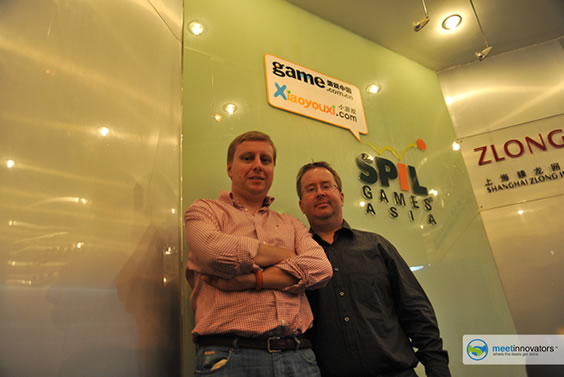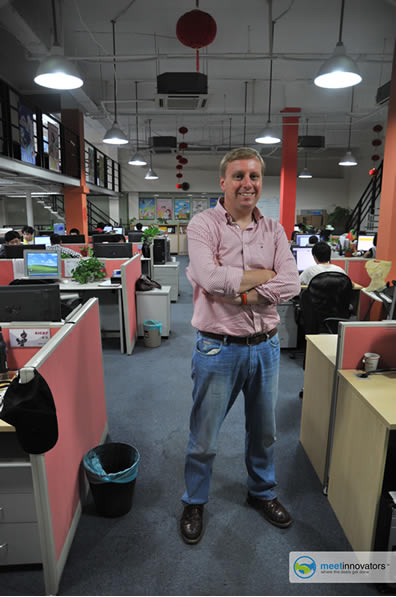
- Meet one of the few successful foreign entrepreneurs in China
- Find out about how he cofounded Tudou, China’s version of Youtube
- Learn about casual gaming, one of the major growing online markets and the business model behind it
- Play one of their most popular games (scroll to the end of the interview)!
This interview was arranged by Georg Godula and Markus Fuhrmann from Web2Asia.com
Full Interview Audio and Transcript
Personal Info
Hobbies and Interests: Endurance sports, good food and wine.
Sports teams: Doesn’t have any favorite teams; just does sports himself.
Favourite Books:
- God Is Not Great by Christopher Hitchens
- The World Is Flat by Thomas L. Friedman
Favourite Entrepreneurs: Jason Calacanis, Steve Jobs.
Twitter url:: http://twitter.com/chijs
Personal Blog: http://www.marc.cn
Company website: http://www.spilgames.com
Fast Track Interview
Adrian Bye: Today I am sitting in the Shanghai office of Marc van der Chijs, who is the CEO of Spil Games Asia. He has also worked in a start up called Tudou, which is basically the YouTube for China. This is an interview I have really been looking forward to doing because Marc is living in China as an expat. Marc, thanks for joining us. Can you tell us a little about who you are and where you come from?
Marc van der Chijs: Sure. I’m Dutch originally. I’m 36 and married with two kids. I have been in China for about ten years now. I came here originally working for DaimlerChrysler in Northeast Asia and did that for a couple of years. During that time, I saw a lot of entrepreneurial opportunities in the market, but they were things I couldn’t do while working for a multinational.
 In 2002, I decided to quit my expat job with its good life, nice car, nice house, and business flights all over the world to go back to a smaller apartment with a bicycle and study Chinese for a while. My idea was to study for one year and then see if I could set up my own business. After one month, I started setting up my business along with working on my studies. In January 2003, I quit my studies after I finished the first semester of Chinese and started my first real business full time.
In 2002, I decided to quit my expat job with its good life, nice car, nice house, and business flights all over the world to go back to a smaller apartment with a bicycle and study Chinese for a while. My idea was to study for one year and then see if I could set up my own business. After one month, I started setting up my business along with working on my studies. In January 2003, I quit my studies after I finished the first semester of Chinese and started my first real business full time.
Adrian Bye: Let’s talk about some of the companies you have been involved with here in China. Let’s start with Tudou. Why don’t you tell us a little bit about how Tudou works?
Marc van der Chijs: Tudou is basically comparable to what YouTube is doing in the US. The main difference is that we’re only doing it in China with all of our servers inside China. The content is similar in that it’s a lot of user-generated content, but it’s also a lot of professional-produced content with TV shows and movies. We have our own HD channel too.
Tudou is much more than just the funny clips you see on YouTube; they’re there as well, but it’s just one part of it. Professionally-produced content is much more important. It’s also the direction that we are going into ourselves. We are investing in our own productions and co-producing feature films at the moment.
Currently, Tudou has over 100 million uniques per month. That’s only China, of course. People will play about 3 billion clips a month on the site.
Adrian Bye: Why don’t you tell us about your current company Spil Games?
 Marc van der Chijs: Spil Games is originally a Dutch company that started in 2001 with affiliate deals, chatting and all these kind of things. In 2004, they decided to look at online games as flash games, and they built some flash games websites, mainly in Europe at that time. In 2005, they started to look at more international markets, and asked me to help as a consultant to set up a website for them in China.
Marc van der Chijs: Spil Games is originally a Dutch company that started in 2001 with affiliate deals, chatting and all these kind of things. In 2004, they decided to look at online games as flash games, and they built some flash games websites, mainly in Europe at that time. In 2005, they started to look at more international markets, and asked me to help as a consultant to set up a website for them in China.
When I was building the first website here and trying to get the licenses and all these things in China, I realized that the game market was going to be huge. After about one or two months, I called them and said, “I think I want to do this full time. I think I see a huge opportunity here, but I want to do it independently. I’m not going to be a subsidiary to your companies. Let me handle this here.” Basically, the original deal was that they invest money in the company, but let me run it.
Then it became a bit bigger than we originally thought. Originally, the idea was to build one website in China. Now, I have two big portals here. We’re probably number two in the market for flash games at this moment with about 32 million uniques per month.
We also have a game studio here where about 50 people make flash games and produce one or two new games a week. We also run websites in India and Indonesia and just started in Japan.
Adrian Bye: Can you help me understand the casual gaming market and the business model behind it?
Marc van der Chijs: The games are normally single player games. Some have multi-player games, but most are relatively simple games. You play them for 10 to 20 minutes maybe. The users are different. It’s not something you play for hours like World of Warcraft or lots of big MMO games.
The business model at this point is still mainly advertising around the game or advertising inside the game. For example, a pre-roll before you start playing the game or billboards inside the game. For instance, you click on a game and it opens a small window and around this window you see some banner ads.
I do see the business model changing to virtual items more and more. For example, people will not pay for these games because they’re too cheap. People may want to pay for additional levels though. For example, if the game has five levels, but you can see in the game that there’s three more levels that you can’t enter, they may be willing to pay a small amount like a quarter or 50 cents for those extra levels. When they’re hooked to a game, people may feel like, “Okay, it doesn’t really matter if I pay a quarter right now.”
 If you build casual games into a social network such as either on your own social network or play them on Facebook, people may also be willing to pay more to get a better sword, a better car, a high score, or to beat their friends. Actually, I think that’s going to be a new revenue stream for flash games. You see that already in the big, massive multiplayer online games, and I think it’s going to be something in the more simple flash games.
If you build casual games into a social network such as either on your own social network or play them on Facebook, people may also be willing to pay more to get a better sword, a better car, a high score, or to beat their friends. Actually, I think that’s going to be a new revenue stream for flash games. You see that already in the big, massive multiplayer online games, and I think it’s going to be something in the more simple flash games.
The other thing for casual games is it’s going to be on mobile phones, I believe. It’s still not that big, of course, but I think Spil Games could do a lot more in a few years.
Adrian Bye: Is the company profitable?
Marc van der Chijs: We’re making money. I feel now is the time to grow in the Chinese market. If you sit down, relax, and think that things are going well, people are going to pass you on the left and right. You have to keep on growing and investing in the company. We decided to spend almost everything that we’ve earned and put it back into the marketing through building new good games and being present on direct websites.
We don’t really use things like Google ads or Baidu ads. We use our games to do the marketing. We build new games and give these away for free to other competitor-based websites. They get free content, but they’re branded with our website game.com.cn. Then people see one or two new games every week on their website where they only play games. Eventually they will click on our logo in the games, go to our site, and realize that game.com.cn is a little bit better than the site they are currently playing on. That’s the major reason why we have grown so much over the past two to three years.
Adrian Bye: How do knock offs work here and how do you guys defend against them?
Marc van der Chijs: People copy all the time, and that’s fine. We always think we have better game designs and better game play. Copying is not enough, though. You need more. You need innovation. You need to understand the game play.
That’s also why we give away our games actually. We feel that if we give away our games, we have branding. If people copy them, the game play wouldn’t be as good as our game play, so it doesn’t really hurt us that much. People probably realize that the brand of games we distribute is a lot better than the people who copy our games.
Adrian Bye: You talked a little about social networking. Is there any kind of social networking built into Spil Games or is that going to come out in the future?
Marc van der Chijs: We’re working very hard on these things. At this point, in China, we actually have social networking functions as part of the passport function we have, but it’s not enough.
We’re now seeing that social networks are actually becoming competitors. The social networking sites in China are more gaming sites than real social networks. People don’t really post their private life and pictures anymore, but they post their high scores and even screen shots from the games. It’s also extremely viral.
 This wouldn’t work outside China probably, but it does work here. The market here is so different from the market outside China. For example, I always assume that pop ups would be death for the website. If I look at pop ups on our websites, we don’t see any change in traffic. It doesn’t deter people, and here you don’t even have complaints.
This wouldn’t work outside China probably, but it does work here. The market here is so different from the market outside China. For example, I always assume that pop ups would be death for the website. If I look at pop ups on our websites, we don’t see any change in traffic. It doesn’t deter people, and here you don’t even have complaints.
Adrian Bye: Could this be because China is still in a state of change and not all these people are engaged in what they are going to be doing yet?
Marc van der Chijs: No, it really has to do with the fact that people like a chaotic look on their websites. For example when I started the first Spil Games websites, I started with a very clean, nice design from Holland that made it very easy to find the right games. The games were all in categories, and there was not too much advertising. We launched it and drove some traffic. People started playing the games, but they didn’t come back. We were like, “What are we doing wrong?” We tried it for about a month. Some people were coming back, but most people just came once and didn’t return.
I thought, “Maybe we are not doing the right games?” Then I was talking to my team, and we decided to give it a try with a very Chinese looking site. We built a Chinese website with blinking ads, a chaotic look, and pop ups. We launched it, and from that moment it started growing. We drove traffic, and people stayed and then returned. It completely blew me away; China is so different. In every single country in the world, even India, we use a similar design for our website, except for China. The design doesn’t work. China is really different.
Adrian Bye: Why do you think people are attracted to a more chaotic look?
Marc van der Chijs: I think they’re used to a more chaotic life. Look on the streets: all the neon advertising to the sounds blaring from all those stores, the honking cars, and people screaming. They’re used to this. I think they’re sort of looking for it in the internet as well. I feel they may not feel happy when it’s too quiet somehow. That’s the only thing I can think of. It’s probably in the minds of people who are used to a chaotic life.
Adrian Bye: I’m fascinated by China. If I want to move to China and get started here, what would your advice be to someone like me who would be an expat?
Marc van der Chijs: Learn Chinese. That’s the mistake I made originally. I should have learned more Chinese. It would have made my life a lot easier. I still need translators for meetings because you want to make sure you understand everything. Second of all, spend some time here before you get started. Build your network. If you’re really right off the plane, you cannot start a business here because you just don’t know how it works.
Things work differently from what you read in the official laws. You need to know the right people. Some of the things are still done the old way. You really need your network here. You cannot rely on regulations, and you need to really understand how it works.
Find a good local business partner. There are so many regulations you have to go through, and you need to know the right people. As a foreigner, if you’re not going to do it, you’re going to fail. Find a good Chinese business partner, and then the chances of success are a lot higher.
As far as working with foreign companies, if you look at what Google has been doing or Yahoo over the years here, none of them have really been successful. The main reason is they’re too dependent on their mother company. If you do something for another company here, make sure you’re independent where you can decide what to do, run your own business the way you think it should be done, and not have to wait for the mother company to make decisions.
For example, last year we had the earthquake in China followed by a three day national mourning period. We were informed on Sunday night at 3:00 a.m. that all the sites had to close down. If you have to wait for your headquarters in the Valley, for example, to wake up, it would be like 18 hours later to get their approval to do this and maybe they need to have a meeting there.
You’re going to be too late, and you’re going to be punished because they didn’t close their sites. With those sorts of things, you need to be flexible and react quickly. If you have to wait for your headquarters to make a decision, you’re going to be too late because the local entrepreneurs can make decisions right away.
More game links:
Uphill Rush (English)
Uphill Rush 2 (Chinese)
Uphill Rush (Chinese)









